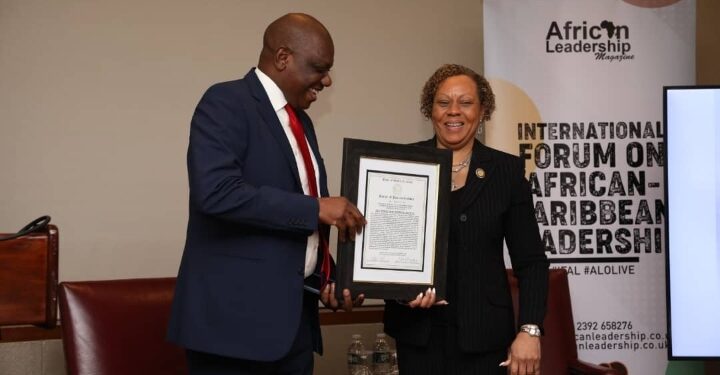By Israel Bulus, Kaduna
The Senator representing Kaduna South at Nigeria’s National Assembly, Senator Sunday Marshall Katung, has added another cap to his feather as he bagged another prestigious African and Caribbean award at the ongoing United Nations General Assembly (UNGA 79) in New York, United States of America.
According to the organizers, the award was in recognition of Senator Katung’s outstanding legislative performance in Nigeria’s National Assembly.
The Senator also received recognition and commendation from the South Carolina State Legislature following a motion by Representative Rosalyn Henderson-Myers, acknowledging his sterling legislative contribution to the growth and development of Nigeria.
Presenting the award to Senator Katung during the International Forum of African-Caribbean Leadership (IFACL), which is part of activities at the ongoing UN General Assembly, the founder/Executive Chairman of the African Leadership Magazine, Dr Ken Giami, said the choice of Senator Katung for the African Leadership Legislative Excellence Awards Senator was in recognition of his “outstanding posturing as one of the continent’s outstanding public servants and parliamentarian with exceptional professional expertise and leadership savvy.”
The organizers highlighted and listed Senator Katung’s honesty, transparency, dedication, and unalloyed commitment to excellence, youth development, and empowerment as the basis for these honors.
According to the organizers, the award also recognizes Senator Katung’s diverse accomplishments and exceptional stewardship to the people of Kaduna South Senatorial District, as well as his numerous achievements and efforts to address security challenges, improve healthcare delivery, and promote education within his region.
Delivering his speech at the International Forum of African-Caribbean Leadership (IFACL), which is part of activities at the ongoing UN General Assembly in New York., Senator Katung called for concerted efforts to address climate change challenges in Africa and the Caribbeans.
He said that Africa and the Caribbean must face common challenges such as climate change, poverty, inequality, and social injustice.
According to him, “These necessitate a collective call to action beyond the rhetoric of oratory. Many African and Caribbean countries are currently at risk of not meeting the SDGs by 2030 thus the imperative and urgency to rally around Goal 17: Partnership for the Goals.
“To effectively tackle multidimensional poverty, environmental degradation, sustainable development as well as resilient societies, we must adopt a multi-stakeholder approach that engages all sectors of society,” Katung said while calling for a paradigm shift with the parliament effectively playing its legislative functions, from traditional representative democracy to a more inclusive, participatory, accountable and responsive democracy.
“The current system has fallen short and we must acknowledge this reality,” Katung said, adding that the demand for participatory democracy is growing and that African and Caribbean countries will eventually need to embrace the shift to build resilient societies that truly represent the voices and needs of their citizens.
“In this regard, the role of the parliament cannot be overemphasized. Parliament has the mandate to enact laws that support multi-stakeholder partnerships, provide appropriation resources and funding for partnership initiatives, and hold the executive accountable for their commitments and actions towards such partnerships.
“Thankfully, despite threats of rising authoritarianism and closing civic spaces globally, many countries have embraced the Open Government Partnership (OGP).
“This is a global reform initiative that is being co-created and championed by reformers in governments and civil society to foster a culture of public transparency, accountability, and responsiveness and is key to galvanizing multi-stakeholder partnerships that can help accelerate the move from transactional changes to achieve transformational progress.
“The importance of supporting regional integration and cooperation in Africa and the Caribbean cannot be overstated. Leaders, including parliamentarian, must acknowledge that resilient societies are built through collaborative efforts across all sectors, driving economic growth, social progress, environmental protection, and inclusive development,” Katung said.
Governor Douye Diri of Bayelsa State was also presented with the award of Best Performing Governor Award by Founder/Executive Chairman of the African Leadership Magazine, Dr. Ken Giami, as well as bestowed honorary citizenship of the State of Georgia on Diri and legislative recognition of the South Carolina State Legislature.
The event attracted several political, business, and industry leaders, including the President and Chairman of the United States Export-Import Bank, Reta Jo Lewis, Governor of the Central Bank of Barbados, Dr. Kevin Greenidge, and President/Chief Executive Officer of Hightower Petroleum, Stephen Hightower.
Also in attendance were Rosalyn Henderson-Myers, a member of the South Carolina House of Representatives, Dee Dawkins-Haigler, former chair of the Georgia Legislative Black Caucus, Harry Kalaba, former Zambia Minister of Foreign Affairs and Chairman, Citizens First Party of Zambia as well as Ms Nomvule Mokonyane, Deputy Secretary General of the African National Congress in South Africa and other leaders from Angola, Ghana, Uganda and South Africa.











